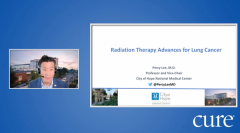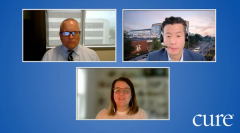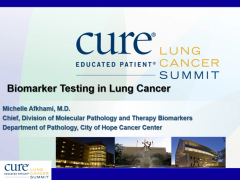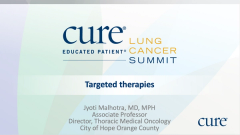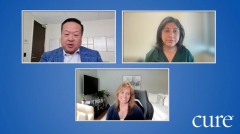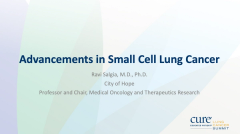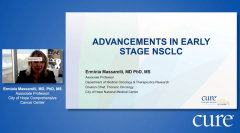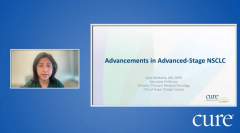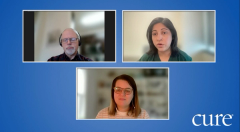
Educated Patient® Lung Cancer Summit Looking Ahead Panel: April 29, 2023
Watch Dr. Jyoti Malhotra and Ken Culver answer questions about the future of the disease during the CURE® Educated Patient® Lung Cancer Summit.
Episodes in this series

This panel was moderated by Darlene Dobkowski, and included Dr. Jyoti Malhotra and Ken Culver, from ALK Positive.
Dobkowski: So one of the first questions that we received is do you think (next generation sequencing [NGS]) should be used in early stage lung cancer for choosing neoadjuvant therapy and will the ROS1 (mutation) rep patients benefit from (Opdivo [nivolumab] in the neoadjuvant setting?
Malhotra: So that's a great question. And it's a great question because a lot of us thoracic oncologists are dealing with that question and trying to see what's the best approach. So as we know, immunotherapy does not work well for patients with targets, especially EGFR and ALK. For some of the other targets, like RET and MET, like you mentioned, we don't know, we don't have data. But based on small studies, small case studies, we know that they don't probably work as well, similar to what we see with EGFR, so we need to be cautious. For now, the guidelines say only to exclude patients with EGFR and ALK from neoadjuvant immunotherapy. For the other targets, I would say, the consensus is that we should still try immunotherapy till we get more data. One point to note here is that some of the targets such as BRAF and KRAS actually respond to immunotherapy. So I think, based on their target identified, I would recommend that patients should have a discussion with their doctor, because each target is different, and the approach should be different.
Dobkowski: Ken, I'm going to loop you into the conversation right now, what were your thoughts about all of the advancements that are occurring in both small cell and non-small cell lung cancers?
Culver: Well, that's easy. They're exciting, but none of them are fast enough. That's the problem. It takes too long to get many of these into a commercial setting out of an academic institution. So at ALK Positive, we're really focused on trying to make that transition quicker. Because if any one of those ADCs, for instance, are what we're looking for in lung cancer, we need to get into the patients as soon as possible beyond the clinical trial setting.
Dobkowski: Very good point. So moving on to another question that we received: If chemotherapy has proven in trials to not be a particularly useful solo, but has some benefit combined with Opdivo, what leads to benefit or the belief that chemotherapy is used at all, especially after a surgery which can heighten the risk of micro spread?
Malhotra: So you know, my point here is that immunotherapy doesn't work for everyone. Right? So we sometimes need another drug to kind of help it. So as I mentioned, immunotherapy and the benefit from it is based on PD-L1 expression for some of the patients in whom the PD-L1 is not high or 0%. Using immunotherapy by itself will not be effective enough. And in those patients, we need to give a backbone of chemotherapy so that the two of them can work synergistically to try to reduce the tumor.
Dobkowski: Another question we received is if one immunotherapy drug doesn't work or has limited results, is it possible for another immunotherapy drug to work if switched?
Malhotra: So from the data that we have seen, drugs that target PD-1, if one is not working, the other PD-1 targeting drug is not going to work as well. We haven't seen much benefit. Changing the class of drugs may work. So for example, if someone tries a PD-1 immunotherapy drug and it doesn't work, maybe adding a CTLA-4 targeting immunotherapy drug may work. So that's something we're still trying to learn about. And then there are a lot of other immunotherapy targets, such as Lag-3 and TIGIT. And these are all part of the whole conversation that we talked about happens between tumor cells and immune cells. And this is all being looked into right now. But I would say that if someone has not really responded well to a PD-1 or PD-L1 targeting drug, there is probably not a good chance of them responding to another PD-1 or PD-L1 drug if used by itself. There is some data coming out that if you change, or if you add another drug to it, such as a VEGF inhibitor, it may work but that's still in research.
Culver: I think one of the things that's important to keep in mind as was just said, the checkpoint inhibitors for PD-L1 and CTLA-4 are only two checkpoints of many on a T cell. There are also checkpoints on macrophages which are key to the anti-tumor response. So when we say an alkane EGFR, they don't respond to immunotherapy, we only mean PD-1 inhibitors. And so for those of you that have different kinds of lung cancer, we really need to push along these other immunologic targets just because a patient doesn't respond to PD-L1 doesn't mean they won't, might not respond to something different. So don't give up hope. We're working really hard on trying to figure out what other immune targets will work for the different subsets in lung cancer. But we always want to be careful in saying it's PD-L1 checkpoint inhibitors are the ones that have not shown activity in EGFR and ALK, for example.
Dobkowski: That's a good point. Dr. Malhotra, do you have anything to add?
Malhotra: I completely agree with it. And you know, we use the word immunotherapy quite a lot. But as Ken said, it means a lot of different things. So when you talk to your oncologist or your doctor, be specific and ask them, “What do you mean by immunotherapy?” So I think it's important to be aware about that, especially as newer and newer drugs come out.
Dobkowski: Now, speaking of immunotherapies, why are we not seeing any oral medication immunotherapy trials and approvals?
Culver: I can just add that there is an oral CTLA-4 inhibitor in development. So most of them now are intravenous because they're monoclonal antibodies. And so the traditional tyrosine kinase drug development pathway has not really worked because the target isn't a tyrosine kinase. So there are a lot of reasons, but it's not lack for trying. People are trying all kinds of ways to solve that problem.
Malhotra: Yeah, you're absolutely right. There are trials ongoing with oral PD-1 as well as oral CTLA-4. I was personally involved in the conduct of a trial with the oral PD-L1. But we still haven't seen similar benefit from some of these drugs yet. So we can't really move them to the clinical side, till we actually see that they are as good as the intravenous drugs. But that's a work in progress. And I don't think we have given up on oral immunotherapy yet.
Dobkowski: And speaking of works in progress, another question we received, are there any developments for TP53?
Malhotra: Okay, that's a tough one, because as you know, we haven't really been able to target that, right. Some show drugs have been used to target say, some of the surrogate targets right next to TP53 or downstream of TP53. But we really haven't seen anything. And I can tell you a lot of researchers are working on it. But we really don't have anything targeting TP53. In late development, there is a lot of research going on at the basic science level at the early development level.
Culver: That's what the most commonly mutated gene in cancer. We desperately need something. So yeah, it's tough. And unfortunately, that's what God had to say as your first word. Right? That's a tough one.
Dobkowski: It truly is. So speaking of ALK mutations, could you tell the audience what the best target drug for ALK mutations is right now?
Culver: Well, you know, we've seen a progression, in my opinion, what we've been looking at, in my opinion, things with each inhibitor are changing and improving. The big controversy of the moment and ALK is do you start with (Alecensa [alectinib]) or (Lorbrena [lorlatinib]). The lorlatinib data hasn't finalized yet with its (progression-free survival [PFS]), but it looks to be longer than alectinib. So there's a big debate in the community about how to sequence these inhibitors. For outpatients, this is awesome that we have multiple drugs that gives a median overall survival of seven years, but none of them are curative. So that's the question at the moment, but it's not our long-term answer.
Malhotra: Yeah, I agree with it. One point I want to add is that in every setting for ALK, for other targets, we have a number of drugs approved and sometimes there might be some differences in side effects. For example, alectinib and lorlatinib and if there are some differences and side effects, and sometimes a decision may be based on just that, right? So conversation between the patient and the oncologist is important as we continue to perfect or get developed better drugs.
Culver: That's nicely said. And I heard it said all today, Darlene, that patients need to be their own advocate. They need to be educated on this. And I think one of the key points then is, well, what is it you need to know when you go in there? Right? And one of the things which I would generally just say is, you need to know what matters to you most when it comes to side effects, quality of life and efficacy, because there are almost always trade-offs. Something more efficacious may well have more toxicity in you as an individual for you. You need to go in having a good idea of what really matters. And it's not the same for every person, because we all want both. We want highly high efficacy and very little toxicity. But that's one of the things when you're in a discussion with your oncologist. It's really helpful if you've really thought through that ahead of time.
Dobkowski: You mention side effects, one person asked so what are some immunotherapy side effects that would require steroids and what are some minimal side effects not as much of a concern?
Malhotra: So that's a good question. So the most common side effect from immunotherapy is actually fatigue. And the second most common is thyroid dysfunction, meaning that thyroid numbers can be off and usually the treatment is starting patients on thyroid replacement medication. The side effects that really happened from inflammation of an orgon are less common, less than 5%. And those are usually when they are severe, they require steroids. So one example would be pneumonitis, which is inflammation of the lung, when patients present with coughing and shortness of breath. And when we do a scan, we can start to see these densities on infiltrations into the lung that require steroids. Some patients present with colitis, or inflammation of the colon. And they present usually with diarrhea and that needs to be worked up and started on steroids. Similarly, the liver is another commonly involved organ when it happens in which patients present with either jaundice or the liver numbers going up on the bloodwork. And that requires steroids. And then there are some very rare ones, which happen once in a while, like maybe 1 in like 1,000 patients, but they do happen, such as inflammation of the neurological system or the heart. These are rare, but we need to be on the lookout for these for that select patient.
Dobkowski: So you mentioned pneumonitis. And let's say if a patient experienced that type of side effect on a drug or an immunotherapy like Keytruda (pembrolizumab), can they expect the reaction like that with all immunotherapy trials? Or would it be specific to that one?
Malhotra: So that's a good question. One thing to look at is the severity of the side effects, right? Like if someone had mild pneumonitis, they can sometimes, after treatment with steroids, be rechallenged with the same drug or a same class of drugs. But if someone had really bad pneumonitis, requiring, say, a prolonged course of steroids or multiple drugs or hospitalization, then those patients we know, in the future, are at increased risk for pneumonitis. Not just with the same drug, but also other drugs with this in the same class.
Dobkowski: You got it. So I feel like there's a lot of talk about, especially in the chat, are there any new developments to replace Tagrisso?
Malhotra: The answer is yes. Because every company out there, other than the company that's making to restore osimertinib is trying to develop a better drug. So the answer to that is, yes. Do I know which drug it will be? And who will be manufacturing that drug? I don't know. There are trials ongoing with the next generation of EGFR inhibitors, which are thought to be more effective, like have more on target engagement for the EGFR gene. So it's a work in progress, but yes, there are trials. We're looking at it and then it's not just TKIs, right. There are other drugs being developed targeting EGFR, which are not necessarily TKIs. And for example, there are bispecific antibodies being developed targeting EGFR, so a lot of work is being done. I would say, as Ken had pointed out earlier, it's not happening as fast, but it's happening.
Dobkowski: Are their trials in final phase for immune drug therapy exon 20, as well as with TP53, which is very common in other cancers.
Malhotra: So not with immunotherapy for those two targets in late phase, now we do not.
Dobkowski: And then how well does immunotherapy like Keytruda and carboplatin work for non-small cell lung cancer that has metastasized to the brain?
Malhotra: So, you know, there's a blood-brain barrier, which exists between the brain and the rest of the body and not everything grows through that blood-brain barrier. We know that chemotherapy doesn't go through that blood-brain barrier, right. And then as in terms of immunotherapy, we don't have very detailed data. But there may be some penetration but not a whole lot compared to what the TKIs do. So I wouldn't say that immunotherapy and chemo work as well in the brain. They work in the rest of the body. There are trials ongoing to see how much is the benefit of immunotherapy for untreated brain mets. Those are still ongoing. But if someone had big symptomatic brain mets. I would just treat them with radiation rather than hoping for the chemoimmunotherapy combination to work for them.
Dobkowski: So if a patient has a good response to pembrolizumab, what advice do you have about continuing indefinitely or stopping for a pre-planned period of time or unless there is further need?
Malhotra: So the trials that happened for non-small cell lung cancer with immunotherapy, most of them treated the patients for two years. That's how they were designed. And that's how the clinical adoption for immunotherapy has been in which we recommend patients to stop immunotherapy after two years. But there are a number of caveats to that, right, we don't have a clear answer, what's the optimum time? What we do know is that patients who make it to the two-year mark and have no evidence of disease, they have a very low chance of the cancer coming back if they stop the immunotherapy at that point. We also see that the patients who complete the first year on immunotherapy, the chance of the cancer recurring after that goes down. But what's the magic number? We don't know until we don't know, I would say that. We should just stay with what we know, which is that two years is the recommended time to receive it. And then patients can go off (therapy) as long as they stay on close surveillance.
Dobkowski: Someone asks something that's very prominent in our news lately. When will there be a vaccine for cancer?
Culver: Well, not soon enough, I guess would be my theme. We we've learned so much more about the immune system in the last decade. It's just phenomenal, which gives us hope we had positive or funding for a vaccine trial in ALK. Turns out that ALK is an immunogenic, which means the immune system sees it. And many of the patients do have some low-level immune response. So we're thinking that we might be able to amplify that with a vaccine specifically to ALK we won't know. And there's a long history of cancer vaccines not having the activity that we really need. I think its vaccine sounds great because we've all seen the great efficacy around COVID. But there are a variety of other techniques such as T-cell therapy, where we are basically having the immune system target to cancer. So it's not like vaccine is the only way to cure these cancers. But it is one that we're all familiar with and we need progress there.
Dobkowski: That was very well said. So as Ken said, target engagement has been a challenge for development of vaccines for lung cancer, we haven't been really able to capitalize on the targets or the receptors that are expressed on the lung cancer cells to develop vaccines. And as some of you may know, we do have vaccines approved for some other tumor types such as melanoma, but those are vaccines which are given or injected directly into the tumor, which is not something we can do for lung cancer. There is a whole barrier of how we get a vaccine on a on a regular basis into the lungs for example. So There are a lot of, I would say logistical and scientific challenges right now. There have been some studies which have shown that vaccines when used for lung cancer did show antibody responses, but they did not show a significant tumor reduction. So that's where we are right now. We know it can be done, but we are not close.
Dobkowski: Is there a website for each trials’ current findings?
Malhotra: Every trial is registered on clinicaltrials.gov. It also requires the results to be uploaded by the study investigators once the trial is completed within a certain amount of time. But the limitation there is that the results wouldn't be uploaded till the trial has completed. And so for example, if a trial reports on interim results, or if there is a phase 1 trial with many arms, the results probably will take a long time to be reported. So there are some barriers there. And I think that's a great idea, maybe if there was a resource for patients where all the trials and the results, at least the ones that led to FDA approvals were uploaded.
Dobkowski: Any last words or advice you would like to give to patients and their caregivers?
Malhotra: Okay, I can start. So my advice really will be to advocate for yourself. Ask your doctor about the treatment that is being offered, what are the alternatives to treatment? And what would be the next steps if the treatment doesn't work? Because sometimes knowing all this helps you make a more informed decision. And the other thing is that sometimes it is useful to get second opinion, because then you have the perspective of two different oncologists, because you have to advocate for yourself.
Culver: And, Darlene, I would just add, taking it just to a little more broad is that as a patient community, we have to advocate for all of us. And I think you can't get the data that Dr. Malhotra mentioned unless you actually go to the company or the investigator. Because they aren't going to until they publish it at a conference, you're not going to get it. And so it's really, really important to do that. Join a patient group where you can get education and help plan when your cancer progresses. If it progresses, you're prepared and you know what your next steps are going to be a second opinion and a specific place or what the next clinical trials are that you have an interest in. So you're not having this emergency happening and you don't know what to do and I think there are a lot of really smart people. Dr. Malhotra is a great example for getting second opinions to give yourself confidence that you're moving and planning and prepared.
Transcription edited for clarity.
For more news on cancer updates, research and education, don’t forget to

